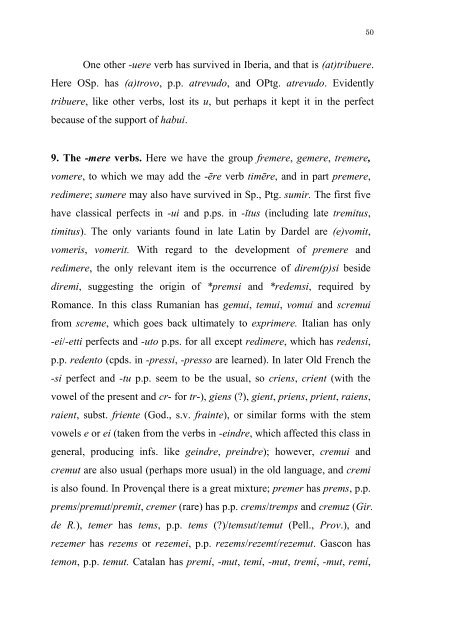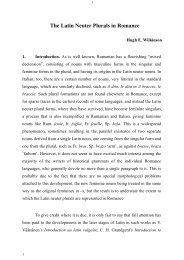THE STRONG PERFECTS IN THE ROMANCE ... - Page ON
THE STRONG PERFECTS IN THE ROMANCE ... - Page ON
THE STRONG PERFECTS IN THE ROMANCE ... - Page ON
You also want an ePaper? Increase the reach of your titles
YUMPU automatically turns print PDFs into web optimized ePapers that Google loves.
One other -uere verb has survived in Iberia, and that is (at)tribuere.<br />
Here OSp. has (a)trovo, p.p. atrevudo, and OPtg. atrevudo. Evidently<br />
tribuere, like other verbs, lost its u, but perhaps it kept it in the perfect<br />
because of the support of habui.<br />
9. The -mere verbs. Here we have the group fremere, gemere, tremere,<br />
vomere, to which we may add the -ēre verb timēre, and in part premere,<br />
redimere; sumere may also have survived in Sp., Ptg. sumir. The first five<br />
have classical perfects in -ui and p.ps. in -ĭtus (including late tremitus,<br />
timitus). The only variants found in late Latin by Dardel are (e)vomit,<br />
vomeris, vomerit. With regard to the development of premere and<br />
redimere, the only relevant item is the occurrence of direm(p)si beside<br />
diremi, suggesting the origin of *premsi and *redemsi, required by<br />
Romance. In this class Rumanian has gemui, temui, vomui and scremui<br />
from screme, which goes back ultimately to exprimere. Italian has only<br />
-ei/-etti perfects and -uto p.ps. for all except redimere, which has redensi,<br />
p.p. redento (cpds. in -pressi, -presso are learned). In later Old French the<br />
-si perfect and -tu p.p. seem to be the usual, so criens, crient (with the<br />
vowel of the present and cr- for tr-), giens (?), gient, priens, prient, raiens,<br />
raient, subst. friente (God., s.v. frainte), or similar forms with the stem<br />
vowels e or ei (taken from the verbs in -eindre, which affected this class in<br />
general, producing infs. like geindre, preindre); however, cremui and<br />
cremut are also usual (perhaps more usual) in the old language, and cremi<br />
is also found. In Provençal there is a great mixture; premer has prems, p.p.<br />
prems/premut/premit, cremer (rare) has p.p. crems/tremps and cremuz (Gir.<br />
de R.), temer has tems, p.p. tems (?)/temsut/temut (Pell., Prov.), and<br />
rezemer has rezems or rezemei, p.p. rezems/rezemt/rezemut. Gascon has<br />
temon, p.p. temut. Catalan has premí, -mut, temí, -mut, tremí, -mut, remí,<br />
50









